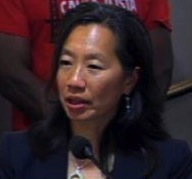Window for City of Oakland to Act on Housing Opportunities for Residents Is Closing Fast
Oct 10, 2015
Posted in Affordable Housing, Community, Gentrification, Responsive Government

By Margaretta Lin
The international peace leader Thich Nhat Hanh teaches us to write love letters to our elected officials.
My mother taught her children that a true friend tells you what you need to hear, not what you want to hear. This is my love letter to you – the Oakland City Council and Mayor Libby Schaaf – after the other night’s council hearing on Oakland’s housing crisis.
I am grateful for your unanimous passage of the Oakland Housing Equity Roadmap’s action plan. After so many years of not having sufficient Council votes to pass fair and balanced rules for development, thank you for taking the first step towards historic action.
Your approval of the roadmap means that the city now has one unified housing plan for its many parts—city departments, city administrator, mayor, council offices, and stakeholder groups—to implement.

We know through previous examples like with the federal stimulus efforts under Mayor Dellums or downtown development under Mayor Brown what can be accomplished when the city has unity of purpose.
I also need to share my concerns coming out of the council process with the hopes that it can help inform your future actions.
It deeply troubles me that no council action was supposed to occur at the meeting.
Had there not been intervention from faith, community, and labor leaders combined with the leadership of Councilmembers Brooks, Kalb, and Kaplan, it seems that the council would not have taken any action that night.
With unprecedented housing unaffordability that has contributed to the loss of more than 24 percent of Oakland’s African Americans and 16.7 percent of its children, the time requires swift action, not more study.
We have had years of studies and process, going back to 2007 when Mayor Ron Dellums’ administration and several councilmembers worked with stakeholder groups to develop policies that would have prevented some of the ensuing displacement.
But no council action then was taken because of blockage from private developer interests.
The city had an 18-month process to develop the roadmap that involved many update reports to the Council CED Committee, briefings with council and mayoral offices, integration of the best thinking of city departments and stakeholder groups, data analysis and research, and review by national housing policy experts.
The roadmap lays out this information in an organized way, including identifying the concerns of stakeholder groups as well as ways to achieve housing equity while balancing private interests.
If you haven’t already done so, please read and use the roadmap.
We need you to run, not walk, to work on the nine anti-displacement, affordable housing production, and habitability policies that require follow-up council legislative action.
These policies have been implemented effectively in other cities without landlords or private developers running away.
At the council meeting, it was an amazing sight to see the diversity of Oakland fill the Council Chamber and overflow rooms. But most of the people were not there when the Council finally took action after 4 1/2 hours.
Please allow the public to speak earlier on the meeting agenda. And please take Council votes early enough in the meeting so that your constituents are there.
It has been heartbreaking to see so many of Oakland’s elders and families struggle so hard to stay in their homes and hometown.
We greatly need your wise, principled, and courageous leadership and action. The window for Oakland to create opportunities for its struggling residents to remain is fast closing.
Margaretta Lin is the co-author of the Oakland Housing Equity Roadmap along with PolicyLink. She served as Director of Strategic Initiatives for the City of Oakland’s Department of Housing and Community Development and is currently a principal with the Dellums Institute, a social justice action tank.